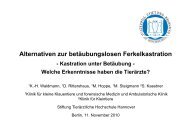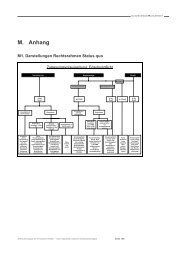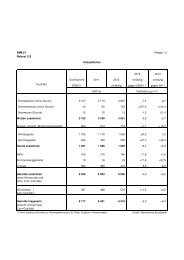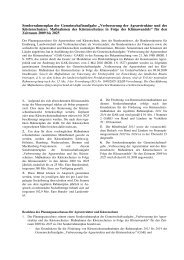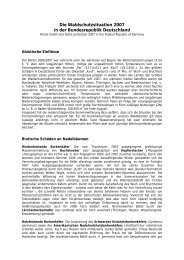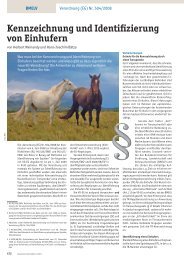Research Institutes overseen by the Federal Ministry of ... - BMELV
Research Institutes overseen by the Federal Ministry of ... - BMELV
Research Institutes overseen by the Federal Ministry of ... - BMELV
You also want an ePaper? Increase the reach of your titles
YUMPU automatically turns print PDFs into web optimized ePapers that Google loves.
under-lying ethological and physiological mechanisms in<br />
coping with stress and <strong>the</strong>ir interplay with performancerelated<br />
regulations is one <strong>of</strong> <strong>the</strong> main preconditions for<br />
humane, performance-based livestock management.<br />
High Fertility and Resistance to Disease<br />
As vitality traits, high fertility and resistance to disease<br />
play a key role in animal production. Selection <strong>of</strong> diseaseresistant,<br />
robust animals is critical, both to food production<br />
and to <strong>the</strong> success <strong>of</strong> domestication and breeding efforts.<br />
Cooperation Activities<br />
Cooperation with science and industry at national and<br />
international level is a key component <strong>of</strong> <strong>the</strong> research work<br />
performed at FBN. The institute is currently involved in<br />
87 cooperation projects with partners at 188 institutes in<br />
32 countries. FBN lays great store in training young scientists.<br />
Some 26 FBN researchers are involved in teaching and<br />
hold visiting pr<strong>of</strong>essorships and lectureships at six different<br />
universities.<br />
Structure<br />
FBN is located in Dummerstorf near Rostock. Of its 228 staff<br />
positions, 66.5 are held <strong>by</strong> scientists. A fluctuating number <strong>of</strong><br />
additional positions are financed from third-party funding.<br />
The interdisciplinary research approach taken at FBN is<br />
based on geographically and <strong>the</strong>matically focused cooperation<br />
between its six research disciplines:<br />
ó Genetics and Biometrics<br />
ó Molecular Biology<br />
ó Reproduction Biology<br />
ó Behavioural Physiology<br />
ó Muscular Biology and Growth<br />
ó Nutritional Physiology<br />
A young foal, Lorinna ET, was born at FBN using<br />
cryoconservation and embryo transfer<br />
25<br />
Pigs use an automated sound-trigger feeding system<br />
developed at FBN<br />
There is also a dedicated research group which studies<br />
functional genome analysis. O<strong>the</strong>r FBN resources comprise<br />
facilities for animal experiments, a scientific library, centralised<br />
computer technology and an administration section.<br />
FBN receives half <strong>of</strong> its basic funding from <strong>the</strong> <strong>Ministry</strong><br />
<strong>of</strong> Food, Agriculture, Forestry and Fisheries <strong>of</strong> <strong>the</strong> State <strong>of</strong><br />
Mecklenburg-Western Pomerania and <strong>the</strong> o<strong>the</strong>r half from<br />
<strong>the</strong> <strong>Federal</strong> <strong>Ministry</strong> <strong>of</strong> Food, Agriculture and Consumer<br />
Protection (<strong>BMELV</strong>).<br />
ó FBN<br />
<strong>Research</strong> Institute for <strong>the</strong> Biology <strong>of</strong> Farm Animals<br />
Wilhelm-Stahl-Allee 2 | 18196 Dummerstorf<br />
Germany<br />
Telephone: +49 (0)38208 68-5<br />
Telefax: +49 (0)38208 68-602<br />
E-mail: fbn@fbn-dummerstorf.de<br />
www.fbn-dummerstorf.de




